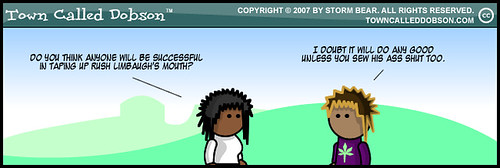Saturday, April 28, 2007
Criminal: Coward
Posted by
Anonymous
at
8:10 PM
0
comments
![]()
Labels: Crime Drama, Ed Brubaker, Icon, Marvel Comics, Sean Phillips, Tom Fontana
Jon Stewart: The Accidental Journalist
Appearing at The Blogging Curmudgeon, My Left Wing, and the Independent Bloggers' Alliance.  Last night "Bill Moyers Journal" aired an interview with Jon Stewart. It was one of those wonderful, rare opportunities to hear Jon Stewart speaking directly and with very little of his trademark humor. He proved once again, as he did when he took the piss out of Tucker Carlson and Paul Begala, that he is actually one of the most insightful political commentators in the business, even though he swears he's not. The entire transcript is available on the PBS site, as is a brief video excerpt. Here are some of the some of my favorite moments. On what is and isn't journalism: BILL MOYERS: You've said many times, "I don't want to be a journalist, I'm not a journalist." On how the White House uses its apparent incompetence as cover: JON STEWART: Yeah, it's kind of astonishing. There is I used to have a real disconnect, I think, with the administration, I couldn't figure out what was going on. I think it's suddenly become clear to me. They would rather us believe them to be wildly incompetent and inarticulate than to let us know anything about how they operate. And so, they do Constitutionally-mandated things most of the time, but they don't — they fulfill the letter of their obligation to checks and balances, but not the intent. On Alberto Gonzales as Henry Hill in the Bush Mob: BILL MOYERS: Tens of thousands, hundreds of thousands of words were written about Gonzales' testimony last week in Congress. And I still don't think a lot of people get it. And all of the sudden, there on THE DAILY SHOW that evening, you distilled the essence of it. On the iconic interview with John McCain: BILL MOYERS: You know, we watched the McCain interview you did this week. Something was going on in that interview that I have not seen in any other interview you've done with a political figure. What was going on in your head? On the devolution of American politics: BILL MOYERS: Why aren't we having that conversation? Well, that's a very good point, Why is the country not having this conversation, the kind of conversation that requires the politicians who are responsible for the war to be specific to the concerns of the American people. I mean, they do come out and a kind of gauze goes up. On our lack of shared sacrifice and why there will be no draft: JON STEWART: It's very hard to feel the difficulties that the military goes through. It's very hard to feel the difficulties of military families, unless you're in that environment. And sometimes you have to force yourself to try and put yourself in other people's sort of shoes and environment to get the sense of that. On his role in the political conversation: JON STEWART: I don't consider myself a serious and social political critic. As do I, Bill. As do I. |
Tell theTruth: Are You A Liar?
|
Friday, April 27, 2007
Take Back the Blog
The Take Back the Blog blogswarm is today.
I'm off to the consecration now. Just me, and 2500 of my closest friends. Sigh...I *really* don't feel up to this, but I don't want to miss it either. |
What have the Republicans accomplished?
Posted by
Storm Bear
at
5:46 AM
0
comments
![]()
Labels: cartoons, comics, elizabeth dole, gop, humor, miserable failure, NC-Sen, politics, senate, webcomics, werewolves
Thank you, Roger Ebert
Also at My Left Wing, Street Prophets, and Booman Tribune |
Thursday, April 26, 2007
Liddy Come Home! (NC-Sen)
 click to enlarge Why us? Why is North Carolina saddled with such a useless and inactive Senator as Elizabeth Dole? She is ranked as one of the "10 Worst Senators" by Empowering Veterans and the real question of her residence always comes into play. Her husband, Bob Dole is a resident of Kansas and they are still married. So how is it she is a resident of NC? How many other couples do you know that have residencies to two separate states? NC deserves better. |
Posted by
Storm Bear
at
5:45 AM
0
comments
![]()
Labels: cartoons, comics, elizabeth dole, gop, humor, miserable failure, NC-Sen, politics, senate, webcomics
Open Thread
So, what stories have caught your attention today? |
Jaco
Wednesday, April 25, 2007
Hey, John McCain "its your support for Bush and his Iraq war ... Stupid"
I'm not with this nitwit, Whit Ayres regarding his comments in WaPo regarding John McCain: "It's a far more competitive race than it was six months ago, but I think people continually have a tendency to jump to premature conclusions about political campaigns," said Whit Ayres, a Republican pollster not working for any of the candidates. He added that McCain's "national stature is so great and the campaign's fundraising potential is so great that it would be a serious mistake to write him off prematurely." Both, NitWit, Whit Ayres, and John McCain have to be stupid to think the American people are going to support his campaign. McCain can launch his bid for the White House all he wants. His candidacy is going nowhere fast. This turkey is done! Former New York mayor Rudolph W. Giuliani has surged past McCain in national polls because of one thing, McCains public and private support for Bush's unpopular war and policy in Iraq. "Hey, John McCain, its your support for Bush and his Iraq war... Stupid" But that is just my opinion. What's yours? African American Political Pundit is a proud member and a regular contributor to the Independent Bloggers Alliance |
Rush The Flaccid Dope Fiend
 click to enlarge I must admit I was shocked that yesterday's strip made it to the recommended list on Daily Kos. It was a lively discussion on what to do about Rush and his use of the song "Barack The Magic Negro." There were many calls for filing a complaint with the FCC. I doubt this will do any good. If you really want Rush off the air, you must go after the advertisers. But there are two types of advertisers that can be found on Rush's show. The first is the local advertiser who usually has no choice in the matter. Most stations I have dealt with at my ad agency will only sell a block of ads that are spread out across the day. So if you want your commercial to be included in morning drive time, you are forced to buy time during the rest of the day so many local advertisers get stuck with their spots during Rush whether they like it or not. This is why I NEVER recommend to any client radio ad buys - you just can't control placement unless you are a national advertiser. Those are who you want. The second type of advertiser is the national client who is buying the ad time through the EIB network, not the local station. These are the buyers that pay the bills, they pay for the satellite time to broadcast the show. The other thing you can do is start contacting the stations. Here is a link to his affiliate list. The best strategy here is to start pressuring the small market stations first. They don't have a lot of cash and DEPEND on local advertising so they may be more susceptible to public outcries of racism. Once smaller stations start canceling the show, larger one may follow suit when pressure is applied to them. If there are African American ministers in the radio station's area, encourage them to meet with the station manager and make their case. I do not have a list of advertisers for Rush's show. The best way to do that is listen to the show today and make a list. Feel free to post those advertisers here. UPDATE: Here is Rush's advertisers for the first half of his show today. Please REC! Select Comfort UsePropane.com Biomet - Oxford Partial Replacement Knee Barracuda Networks - barracudanetworks.com LendingTree.com Cobranded spot: Trico Teflon Blades / Advance Auto Hawthorne Suites Cobranded spot: Laser Shield - lasershield.net / CompUSA Quicken Loans Cobranded spot: Pennington Seeds - penningtonseed.com / Lowes Home Improvement Rinnai Tankless Water Heater - foreverhotwater.com NoMask.com Farmers Insurance Administaff - administaff.com POSSIBLE PSA's Crohn's & Colitis Foundation - ccfa.org] Rotary Club |
Posted by
Storm Bear
at
6:09 AM
0
comments
![]()
Labels: barack obama, cartoons, comics, humor, magic negro, politics, racism, rush limbaugh, webcomics
The Spotlight
Being a celebrity means you’re giving permission for people to look at you, listen to you, pay attention to you. |
Posted by
Anonymous
at
4:28 AM
0
comments
![]()
Labels: Alec Baldwin, Glengary Glen Ross, Kim Bassinger, War of The Roses
Stewart versus McCain
This is worth checking out, especially if you missed it last night. |
Tuesday, April 24, 2007
Rural Georgia school holds first integrated prom
Even though my immediate reaction was, "Their first? Just *now*, in 2007?", I think this is worth celebrating. We all progress at our own pace. |
“Barack The Magic Negro” Plays on Rush. And he is still on the air?
 click to enlarge This is a head-shaker. Imus gets canned for calling some college women basketball players "nappy-headed hos" and yet Rush Limbaugh plays "Barack The Magic Negro" on his show and he is still on the air? How is that even possible? To hear the song yourself, hit this YouTube link. It is a parody by Paul Shanklin impersonating Al Sharpton and based on the Peter, Paul, and Mary hit song "Puff, the Magic Dragon". I am really at a loss of words. I heard it for the first time yesterday on the radio and was sickened. Again, how is this man on the air? |
Posted by
Storm Bear
at
6:29 AM
0
comments
![]()
Labels: barack obama, cartoons, comics, humor, magic negro, politics, racism, rush limbaugh, webcomics
The church as a "public" institution
As I mentioned yesterday, the Diocese of Southern Ohio has a new bishop, and his consecration will be this Saturday. Bishop Katharine Jefferts Schori will come to Columbus to take part in the ceremony. So, ever since I knew this event was coming, it has been my intention to attend if at all possible. On Friday, I heard from my rector that there was indeed a ticket being held in my name. So, yay! So it is significant that they, once they started to build churches, chose the basilica model, which was basically the agora, or public forum. Where God and God's people were interacting publicly and opening themselves to a world where there was really no reason you couldn't be part of that community as long as you were willing to be baptized. And to be baptized wasn't to enter a community, it was to be expelled from any community that was exclusive.More to come, as I find the time, on topics such as ecumenism and interfaith relations--the hard, but necessary work of coming together, respectfully, in our diversity. |
Posted by
Renee in Ohio
at
12:05 AM
0
comments
![]()
Labels: Bishop Thomas Breidenthal, Consecration, Diocese of Southern Ohio, Episcopal church, Katharine Jefferts Schori
Monday, April 23, 2007
VA approves Wiccan symbol for soldiers' graves
I just found this via The Wall (the blog of Americans United for Separation of Church and State: The Bush administration has conceded that Wiccans are entitled to have the pentacle, the symbol of their faith, inscribed on government-issued memorial markers for deceased veterans, Americans United for Separation of Church and State announced today.See also this CBS News report, which included a picture of Sgt. Stewart's memorial plaque.  |
Horse dancing!
What an amusing way to start my day. Via Cute Overload Um. This is beyond weird, People, it's like disco dressage—with ridiculous commentary. [shaking head] After Christopher Guest does a Hedgehog party, he should tackle this... By the way, I met the bishop-elect last night. I somehow made myself introduce myself to him afterwards, even though I was not feeling especially outgoing at the moment. I told him that I had recorded his talk and would be posting some of it as time allowed, as I had done with the sermons by Bishops Robinson and Curry. And then he said, "Oh, you're Renee!" Apparently he'd read my blog posts during General Convention. It's almost like I'm famous. Not Markos on Time Magazine's list famous, but still kind of cool :) |
Dubya
"As democracy is perfected, the office of president represents, more and more closely, the inner soul of the people. On some great and glorious day the plain folks of the land will reach their heart's desire at last and the White House will be adorned by a downright moron." |
Posted by
Anonymous
at
1:47 AM
0
comments
![]()
Labels: Correspondent's Dinner, David Letterman, President Bush
Sunday, April 22, 2007
Are We A Country?
|
Posted by
Robert Ellman
at
5:42 PM
0
comments
![]()
Labels: gun control, Seung-Hui Cho, Virginia Tech University
This Is Your Brain On Iraq
Appearing at The Blogging Curmudgeon, My Left Wing, and the Independent Bloggers' Alliance.  I could feel a huge concussion wave, and then I couldn’t hear anything. I told my sergeants my ears were hurting and that I felt really weird. My vision was acting all strange. -- Spc. Paul Thurman Paul Thurman was not supposed to be deployed. His brain had been damaged before he even left Ft. Bragg; a training accident in which a log was dropped on his head. Brain scans showed evidence of lesions. Yet, inexplicably, he was sent to Iraq. There he sustained a second head trauma; another training accident. An IED simulator went off three feet from his head. Soon he was having dizzy spells, was losing his balance and couldn’t sleep. But Thurman's Kafkaesque journey through the Army system continues. Instead of proper treatment, he has received disciplinary actions for problems resulting from his injury; an Article 15 for leaving a formation to take anti-seizure medication and a bad counseling statement for refusing to attend an 80 hour driving course. His medical file says he cannot drive. Today he is hoping for a court martial hearing so that his story can heard farther up the chain of command. Brain trauma is the signature injury of the Iraq war. As increasingly elaborate body armour protects the torso, and even the limbs, the brain is still vulnerable to shock waves that helmets cannot deter. For the first time, the U.S. military is treating more head injuries than chest or abdominal wounds, and it is ill-equipped to do so. According to a July 2005 estimate from Walter Reed Army Medical Center, two-thirds of all soldiers wounded in Iraq who don't immediately return to duty have traumatic brain injuries. Referred to as "the silent injury," in many cases the damage caused by concussive waves is not immediately apparent. And these "closed-head" injuries are harder to treat than even those commonly suffered by motorcyclists. Traumatic brain injuries from Iraq are different, said P. Steven Macedo, a neurologist and former doctor at the Veterans Administration. Concussions from motorcycle accidents injure the brain by stretching or tearing it, he said. But in Iraq, something else is going on. Indeed it appears that even those troops who are not at close proximity to IED blasts can be affected. It is estimated that one third of our combatants may be suffering brain injuries, many who don't even know that damage has occurred. This has prompted the VA to start screening all Iraq and Afghanistan veterans who enroll. That will still leave roughly two thirds unexamined, as most never apply for veteran's health benefits. More tragic, the Pentagon has demonstrated far less vigilance than the VA in addressing these pernicious injuries. What's baffling is the Pentagon's failure to work with Congress to provide a steady stream of funding for research on traumatic brain injuries. Meanwhile, the high-profile firings of top commanders at Walter Reed have shed light on the woefully inadequate treatment for troops. In these circumstances, soldiers face a struggle to get the long-term rehabilitation necessary for treatment of a traumatic brain injury. At Walter Reed, Macedo said, doctors have chosen to medicate most brain-injured patients, even though cognitive rehabilitation, including brain teasers and memory exercises, seems to hold the most promise for dealing with the disorder. In fact, last summer the Pentagon reacted to the startling numbers of brain injuries by cutting it's funding request for treatment and research of the problem in half; from $14 million to $7 million. That maneuver seems consistent with a larger agenda of minimizing treatment funds to troops across the board. As reported by NPR, troop disabilities are being pencil-whipped down to nothing. Lieutenant Colonel Robert Parker USA (Ret.) found that the Pentagon is now providing disability payments to fewer veterans than they were before the war. Parker started digging through Pentagon data, and the numbers he found shocked him. He learned that the Pentagon is giving fewer veterans disability benefits today than it was before the Iraq war — despite the fact that thousands of soldiers are leaving the military with serious injuries. One of the Pentagon's disappearing tricks is assigning injured veterans drastically lower disability ratings than their injuries demand. Tim Ngo who suffered a traumatic brain injury was rated by the Pentagon as only 10 per cent disabled. Tim Ngo almost died in a grenade attack in Iraq. He sustained a serious head injury; surgeons had to cut out part of his skull. At Walter Reed Army Medical Center in Washington, D.C., he learned to walk and talk again. Even a 30 per cent rating would have guaranteed him a monthly check and enrollment in the military's health-care system. As it was he was given a medical discharge and a small severance payment; leaving him adrift, with no coverage, until he had matriculated into the VA system. Instead, Ngo enrolled with the Department of Veterans Affairs. Typically, there's a waiting period for the VA. Since then, Ngo's injuries have been acknowledged by the VA as so serious that he has been granted 100 per cent disability. In fact, more than half of disabled veterans who transfer into the VA system have their disabilities uprated from 10-20 per cent to over 30 per cent. The Senate is currently investigating concerns that the DOD is simply punting their disabled veterans to the VA to improve their own bottom line. What we have is a military system near the breaking point. Our troop levels are stretched so thin that we are redeploying injured, even broken, troops, and a chronically underfunded VA is left to clean up the damage. Ironically, the very resources that are keeping more of our troops alive on the battlefield, are returning them to a living hell of inadequate treatment. These are the war's injured who once would have been the war's dead. And it is the unexpected number of casualties who in a previous medical era would have been fatalities that has sunk the outpatient clinics at Walter Reed and left those in the VA system lost and adrift. So we are bringing back more of our troops alive but to what kind of life? Marine Lance Cpl. Brian Vargas was a high school football player. Now, even though he looks fit, he cannot toss the football with his buddies, let alone be part of pickup games with other off-duty Marines. |
Posted by
Curmudgette
at
9:14 AM
0
comments
![]()
Labels: afghanistan, Brain Injury, iraq, military, Troops
Susan
Susan Werner is an über-talented artist who plays guitar and piano and sings beautifully, skillfully navigates the genres of jazz and folk, and writes real songs about real stuff that adults living in the real world care about, but it doesn’t feel like math homework or the leftover Brussel sprouts your mom makes you eat. Performing in the margins outside the vapid pop music landscape, this singer/songwriter from the Midwest is deep without being pretentious. Werner is funny, smart, passionate, and very, very sexy. |
Posted by
Anonymous
at
6:20 AM
0
comments
![]()
Labels: Folk, Lost My Religion, Religious Intolerance, Supreme Court, Susan Werner
The Bishop!
(The Bishop was the title of a classic Monty Python sketch, and, in this household, anyway, it's hard to talk about a bishop without getting this in my head!) Sacred Unions is a book about true love. By true love—or romance—the author refers to sexual passion that deepens into the permanent union of two persons in heart, body, and mind. The book is therefore addressed to all true lovers: straight or gay, deep into the adventure of a shared life or just contemplating it, or emerging out of a failed attempt. Lifelong union, Breidenthal asserts, is of central importance in all circumstances; and it remains a viable option for all of us, no matter who we are or what our story is.It occurs to me that there is something a bit...poetic, maybe, about this. The reason we had to wait so long for our new bishop in the first place, is that a moratorium was put in place because of the way some people reacted to Gene Robinson's election and consecration. Just now, I'm reminded of what Bishop Robinson said about the Holy Spirit in his sermon during last summer's General Convention. It's that part of God which refuses to be contained and confined to the little boxes we create for God to live in--safely confined to the careful boundaries *we* set for the Holy Spirit. When the General Convention came to town last summer, I was working days and was thus unable to attend any of the actual convention, but made it to a couple of "off campus events" like the Integrity Eucharist where Gene Robinson gave the sermon I excerpted above and the U2Charist (see Bishop Michael Curry's sermon here.) I knew nothing about the candidates who were being considered for Presiding Bishop, but once Katharine Jefferts Schori was elected and I started to learn more about her, I was quite pleased. That worked out really well, you know? We got a great bishop, who just happens to also be the first woman to become Presiding Bishop of the national church, but, since I wasn't paying close attention *before* the election, I was spared any nailbiting anxiety/anticipation. And, as far as I can tell, something similar happened with the election of Thomas Breidenthal. I even went so far as to download the audio of a forum where all the candidates spoke, so I could learn a bit about them, but never got around to listening to it. I wryly remarked to someone yesterday that elections seem to turn out better when I don't get emotionally invested in them until after the fact. Nah...I'm not really that superstitious. Maybe it was just the Holy Spirit, doing what the Holy Spirit does. And/or wise, strong people on the search committee, able to resist any pressure to go with a more conservative choice. However these things happen, I'm looking forward to hearing our bishop-elect speak at my church this evening. |



















